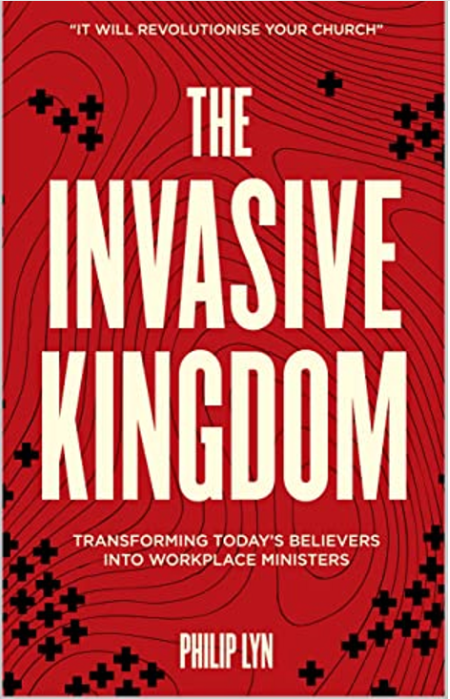
“God wants His people circulating among humanity ushering in His Kingdom and unleashing the power of His love!” [p. 40]
This is the premise for Lyn’s book The Invasive Kingdom. The sub-title foreshadows the methodology he proposes – transforming today’s believers into marketplace ministers. The book makes his case and shows the way it can happen.
Lyn argues, “A proper biblical understanding is that all believers have a calling to leverage their vocation (their work) for the glory of God.” [p. 228]
Workplace as a Gateway
The workplace is the gateway to bringing the Kingdom of God to parts of the world where He is not known. Believers are called to be HIS ambassadors to bring the Good News and take back lost territory. Lyn points out “…the laws, culture and destiny of every nation is shaped by the workplace, not the church.” [p. 48]
The Workplace in God’s Plan
The workplace is huge in God’s plan to redeem the lost world.
- Jesus spent most of his adult life in the workplace before he was a rabbi.
- He spent 92% of his public ministry time in the marketplace (p.66).
- 86% of Jesus’ parables were based on workplace situation.
Sadly, laments Lyn, 87% of believers leave God behind on Monday morning (p.60).
The Church and the Workplace
How should the church then engage the workplace? The author proposes a number of points to mobilize the church:
- We need to engage with excellence.
- We need to bring love and integrity in all we do.
- God’s Kingdom needs to come into the workplace with power and boldness.
- Most of the world won’t come into the Church on Sundays, So the Church must go into the world on Weekdays. (p. 152)
- Lyn calls for a mindset change.
Church work is what you do for the organized institution of the Church. The work of the Church is what is done between Sundays … in homes, schools offices, on construction jobs, in the marketplace…
Page 222
Therefore, the Church must be mobilized into the workplace. To do this the church must:
- Be less “churchy.”
- More welcoming to outsiders.
- Apply God’s truth to meet every day work challenges in practical ways.
Unfortunately, most pastors don’t understand the workplace and are not prepared to provide solutions.
Bi-vocational Models
Bi-vocational work was common in the early church. Pastor Lyn dedicates a lengthy section exploring bi-vocational and alternative approaches to traditional full-time clergy model. He addresses many of the advantages of this approach for reaching the lost. For instance, the bi-vocational workers are more connected to the marketplace. They also are models for what it means to be a follower of Christ.
To be fair, he also discusses the challenges.
Critique
If I were to find fault with the author it might be an over-emphasis on church planting and pastoring churches as part of all ministry calling. There are many roles for Kingdom workers. And varied gifts. Some are equipped to prepare the soil. Others are better at watering. Yet others tend to the harvest. But all are necessary.
How-To
“In a workplace church the expectation is not so much for the world to come into church but for the church to go into the world to reach pre – believers on weekdays.” (p. 225)
“But one of the greatest ways to mobilize the church into the workplace is to invite our pre – believing friends and colleagues to do community work with us…” (p. 221)
The work of the church begins with a mindset and life-style change. Our witness is integrated into our whole life journey. When people encounter us in the marketplace, they should be seeing Christ engaged in the affairs of life.
The church does not engage the marketplace through programs. It engages community through relationships. The relationships are the opening to discipling those who do not know Jesus. As believers model Christ in everyday life, they are learning what we are commanded to do in the Great Commission – “teaching them all the things I have commanded you.”
Marketplace works do need training. Lyn suggest changes seminaries should make to be relevant for marketplace ministry. He goes further showing there are many, often better, alternatives to seminary for equipping marketplace workers.
Finding workplace ministers
Churches need to be intentional about recruiting and equipping people for their marketplace ministry.
There are many people in the congregation who can serve. An active process is needed to identify and prepare them.
Once identified it is important to call them out and set them aside as “workplace ministers” before the congregation.
Resources
The book is a wellspring of resources. Not only do you find the experience and wisdom of the author, but he points to many resources provided by other organizations so the reader develop his own plan for marketplace ministry.
- Written by a practitioner who shares many of his own experiences.
- Covers a broad range of vocations.
- A thoroughly researched book on tentmakimg from an Asia perspective.
- Many case studies from Asia that I have not read about elsewhere.
- Examples from history and contemporary case studies.
- Extensive bibliography
- List of organizations with tools and help for implementing marketplace ministries.
- Fellowship of Companies for Christ
- Seminars
- Alpha Course
- Etc.
Conclusion
The largest and most diverse mission field to reach in the world today remains the workplace [p.264].
By Phill Sandahl
Get the book from your favorite bookstore. The Invasive Kingdom: Transforming Today’s Believers Into Workplace Ministers, by Philip Lyn